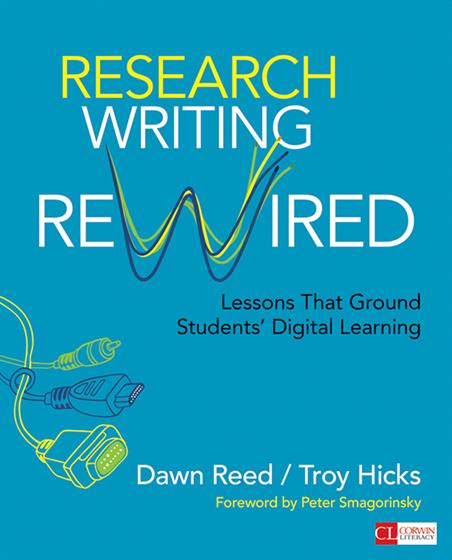At-a-Glance Lesson Summaries
Foreword by Peter Smagorinsky
Acknowledgments
Preface: Reading, Writing, and Inquiry With Adolescents
Why “Rewire” Research Writing?
The Contents of This Book
Our Guiding Principles
Introduction: Framing Student Inquiry
Considering Our Goals
The Big Picture: Broad Curricular Considerations
Additional Curricular Components
Final Considerations
Chapter 1. Introducing Research, Inquiry, and Connected Learning
Preview Lesson: Thinking Through a Cultural Lens
Lessons for Week 1
Lesson 1. Exploring Digital Identities
Lesson 2. Cultural Conversations Online: Joining Youth Voices and Reading Collaboratively
Lesson 3. Beginning the Cultural Conversation
Lesson 4. Exploring Visual Culture Through Food Wrappers and Analyzing Visual Culture
Lesson 5. Introducing Ethnography and the Culture Collage Assignment
Reflections on Embracing Inquiry in the Connected Classroom
Chapter 2. Getting Started With Inquiry Work: Visual Literacy and Literature Circles
Lessons for Week 2
Lesson 6. Visual Literacy and Design
Lesson 7. Culture Collage Sharing
Lesson 8. Literature Circles
Lesson 9. Fashion and Image in American Culture
Lesson 10. Reading Images: Fact or Fiction?
Lesson 11. Personal Inquiry Reflections
Reflections on Mentor Texts for Analysis and Developing Inquiry Questions
Chapter 3. Laying the Groundwork for Research Writing: Developing Close Reading Skills and Organizing Digital Spaces
Lessons for Week 3
Lesson 12. Literature Circle Meeting 1: Engaging in Active Discussions
Lesson 13. Self-Assessment and Reflection
Lesson 14. Language in American Culture
Lesson 15. Literature Circle Meeting 2: Close Reading of Passages
Lesson 16. Questioning and Speculating
Reflections on Developing Close Reading Skills and Organizing Digital Spaces
Chapter 4. Embarking on the Inquiry-Based Research Essay: Collaboration, Citation, and Credibility
Key Features of the Inquiry-Based Research Essay Assignment
Lessons for Week 4
Lesson 17. Literature Circle Meeting 3: Intertextual Connections
Lesson 18. Researching Skills and Tips: Exploring Sources
Lesson 19. Researching (Online and in the Library Media Center)
Lesson 20. Writing and Researching Workshop
Reflections on the Research Process
Chapter 5. Writing Workshop and Media Projects: Responding, Revising, and Reflecting
Lessons for Week 5
Lesson 21. Literature Circle Meeting 4: Final Thoughts and Reflection
Lesson 22. Writing Workshop and Peer Response
Lesson 23. Media Work
Lesson 24. Cultural Questions and Media Literacy
Lesson 25. Workshop: Inquiry-Based Research Essay and Media Projects
Lesson 26. Reflection and Publication of the Inquiry-Based Research Essay
Lesson 27. Exploring Basic Copyright Issues: Copyright, Fair Use, Creative Commons, and the Public Domain
Lesson 28. Reflecting, Sharing, and Celebrating the Final Media Project
Reflections on the Writing Process
Chapter 6. Final Reflections and Conclusions
Assessment: A Flexible, Rhetorical Approach
Purposeful Technology Integration
Conclusions
References and Further Reading
Index
About the Authors




